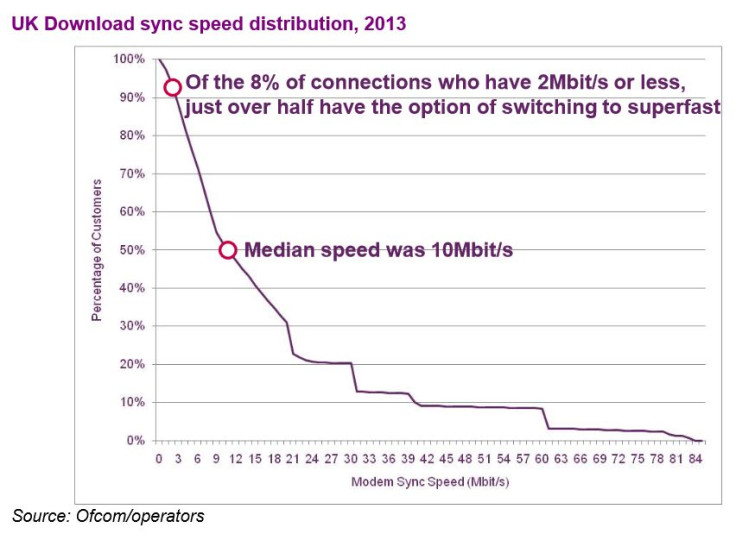UK Broadband: Average Speed of 18.7Mbps Masks Reality of Slow Internet
Ofcom reports average superfast internet coverage is getting closer to government's 24Mbps target

Superfast broadband internet (that is internet connections with a speed of at least 30Mbps) is available to 78% of the UK population, according to UK telecoms regulator Ofcom.
The average broadband speed for residential consumers across the UK was 18.7Mbps in May 2014, but Ofcom says this statistic masks the reality of slow internet access.
Around 3% of UK households currently receive a broadband speed of less than 2Mbps and do not have the option of switching to a superfast option. On a 2Mbps connection running at maximum speed, it would take an hour to download 900MB of data.
The UK government has set a target of 95% of the UK population being able to receive internet download speeds of at least 24Mbps by 2017.
So far £1.5bn (€1.9bn) of public funding has been invested toward this goal. Discussions are reportedly underway on providing superfast broadband for the final 5% of the population.
Ofcom also argues for speeds of 10Mbps to be set as the standard for an effective quality of service.
The figures come as part of Ofcom's latest Citizens and Communications Services report, issued on 31 October 2014, which gives update on the state of UK's telecommunications landscape.

Ofcom reports that there are large variations in speeds locally, regionally and across each of the UK's nations.
Overall, 78% of UK premises were served by next-generation services as of June 2014. Internet take-up has grown and is now at 82% of households, contrasted by 42% take-up in 2002, the year when dial-up internet take-up peaked, Ofcom reports.
While Ofcom reports that the average broadband speed for residential consumers across the UK was 18.7Mbps in May 2014, the regulator warns that this average masks significant variability in broadband performance.
According to Ofcom, 8% of broadband connections operated at speeds of less than 2Mbps in June 2013. Just over half have the option of switching to superfast, at an additional cost of typically £5 to £10 per month.
The regulator states that around 3% of UK households currently receive a broadband speed of less than 2Mbps and do not have the option of switching to superfast.
| Guideline download times | |||||
|---|---|---|---|---|---|
| Download speed | Album (100MB) | TV Show (450GB) | Film (1.5GB) | DVD (4.5GB) | BluRay film (10GB) |
| 4Mbps | 3 min 20 sec | 15 min | 50 min | 2 hour 30 min | 5 hour 35 min |
| 8Mbps | 1 min 40 sec | 7 min 30 sec | 25 min 30 sec | 1 hour 15 min | 2 hour 47 min |
| 16Mbps | 50 sec | 3 min 45 sec | 12 min 30 sec | 37 min 30 sec | 1 hour 24 min |
| 32Mbps | 25 sec | 1 min 52 sec | 6 min 15 sec | 18 min 45 sec | 42 min |
| 50Mbps | 16 sec | 1 min 12 sec | 4 min | 9 min 22 sec | 26 min 40 sec |
UK Broadband Progress
In terms of progress over the last decade (2004 to 2014), Ofcom says that current-generation broadband is now almost universally available.
More advanced broadband technologies, including ADSL2+, DOCSIS 3.0 and fibre-to-the-cabinet, have also been rolled out to large parts of the country, leading to significant increases in average speeds, the regulator reported.
Ofcom has identified three key challenges in working towards its goals.
- Securing a minimum adequate service for the homes that still cannot receive 2Mbps services;
- Improving speeds for homes that cannot receive an effective quality of service, of around 10Mbps; and
- Achieving further increases in the coverage of superfast broadband.
Ofcom says these are being addressed through a combination of commercial investment and delivery, work by the government's Broadband Delivery UK programme, and policy discussions about what is a suitable absolute minimum.
© Copyright IBTimes 2025. All rights reserved.






















